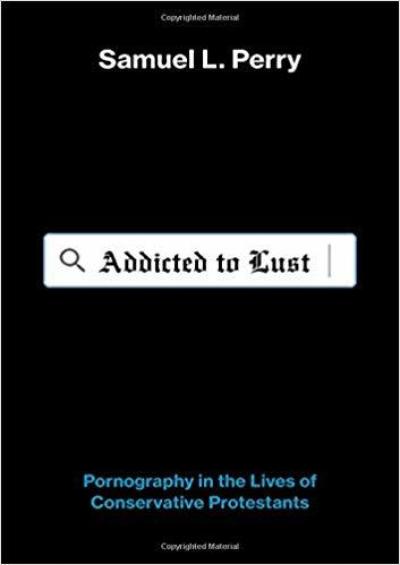How should churches respond to porn use among Christians?
How should churches respond to porn use among Christians?

As pornography use is becoming more common and acceptable in today’s culture, many practicing Christians feel trapped in a shameful dependency they know is direct disobedience to the will of God.
With past surveys showing that as many as two-thirds of practicing Christian men reported looking at porn monthly or more often, professor Samuel L. Perry of the University of Oklahoma contends that many Christian congregations are not effectively addressing the needs of men (and women) struggling with a porn habit.
Perry, a professor of sociology and religious studies who comes from an evangelical background, authored the book Addicted to Lust: Pornography in the Lives of Conservative Protestants. The title was released this month, as May marks National Masturbation Month in some circles.

The book features interviews and survey data to help Perry present a balanced overview of how increasingly easier access to internet pornography is impacting conservative Protestants in different ways than porn users of lesser or no faiths might experience.
“I think conservative Christians are really at a difficult place. In the book, I'd like to say I end on a more positive note. I try to be optimistic. I try to give some counsel on what I feel like would be some helpful steps to take for the subculture generally,” Perry told The Christian Post. “And yet, I got to acknowledge that I think conservative Protestants really face a pickle.”
As a scholar of religion and families, Perry began researching more closely the topic of pornography around five years ago when he was curious about the link between pornography use and divorce. Today, around 20 of his over 50 peer-reviewed journal articles have focused on the issues of pornography, lust and masturbation.
With technological advancements over the years with the internet and smartphones, access to pornographic material is less restricted than ever.
Although conservative Christians are known for holding staunch beliefs when it comes to sexual sin, many conservative Christians also report being helplessly trapped in the grip of pornography dependence as technology is making it harder to avoid the temptation.
“This is a real challenge as the broader culture in the United States becomes more antithetical to a traditional Christian sexual ethic,” Perry explained.
Perry said one of the main points of the book is that among the negative consequences that conservative Protestant users of pornography face is the experience of “consistently, willfully, repeatedly violating their own moral convictions by looking at pornography.”
“[T]hey feel stuck, and they feel judged; they feel like they have to hide it, and lie about it,” he said. “It hurts their mental health when they have to kind of pretend they're not doing this or they feel bad about themselves. It also certainly hurts their marriages and their intimate relationships because they definitely feel like they have to hide that.”
Perry added that data show conservative Protestant women are twice as likely to divorce their husbands over the issue of pornography use as compared to non-conservative Protestant women.
One of the main problems that Perry sees in many congregations in the U.S. is that bringing up one’s struggles with pornography can be a “stigmatizing thing” and “shame-inducing.”
As a result, those struggling with pornography use are less inclined to bring it up or seek help for true repentance.
“Leaders in congregations [should] just come out and say, ‘Let's talk about this. Let's have a meeting every year where we come out and talk about the importance of accountability,’” Perry explained.
He said churches need to do more to discuss openly what sexual purity looks like and how congregants can help one another live a sexually pure life.
“I don't think that's happening in the vast majority of congregations,” he said. “And so I feel like that's going to be required to move forward.”
Perry joked that conservative Protestant churches could take a page out of the Catholic Church’s playbook, where parishioners can go to confess before a priest and seek advice on what to do better.
“Now, obviously, a lot of evangelical communities and conservative Christian communities have instituted accountability groups and small groups,” he said.
“And I think in a lot of these small groups, what was described to me is that you've got a situation where you got a bunch of guys who are sitting around and maybe start off really motivated to get real with one another. And then over the month, it really spirals into like, ‘Hey, let's talk about family. Let's talk about sports. Let's talk about reading the Bible, but let's not entrust to one another how often we looked at pornography in the previous week.’”
With the rise of Neo-Calvinism and a “Gospel-centered approach” to living out the Christian faith, Perry believes that one of the consequences has come in biblical counseling. There has been an overemphasis on thinking that the solution to moral problems is to just “repent and just believe the Good News.”
Part of that, he said, has been a “fear of developing spiritual disciplines to old life patterns or habits.”
“Honestly, from the people I talked to, the most helpful thing that people can do is to develop better life patterns,” he said. “But I feel like there's such an obsession with the thought that my heart needs to be right and I need to pray about this and think about this and remember the Gospel. And yet, I feel like the most helpful thing churches could do is to get real, practical, real quick.”
Perry said churches need to develop systems to “cut off the source” of a believer’s access to pornography.
He believes churches need to do more to encourage their believers to make actual changes in their lives to address the sin they are struggling with. Such ways include trading in a smartphone for a flip phone or beginning to use accountability software like Covenant Eyes or XXXChurch.com.
“When you've got something like pornography use [and] masturbating, which is as much physiological as it is spiritual, in my opinion, I think people are not getting practical enough,” he said.
Perry also believes that calling pornography an “addiction” can make it harder for people to come to grips with the fact that they need to change their behavior to get right with God.
The American Psychiatric Association’s Diagnostic and Statistical Manual of Mental Disorders does not label pornography use as an “addiction.”
“Now, that doesn't mean it's not, it just means that the people who make those manuals that are kind of the Bible for psychiatrists and psychologists, they don't consider it an addiction or disorder,” Perry said. “But I think you've got some evidence to suggest that it doesn't quite behave like we think other dependencies or disorders do, for example.”
Using the word “addiction” to describe a person’s porn problem can be an attempt to “create some rhetorical distance” between the sinner and the “willful disobedience to God," he noted.
For committed Christians, willful repeated disobedience to God is a big problem because even though God has forgiven us of our sins, theologically, we're not supposed to just be able to go back repeatedly time after time,” Perry contended.
“Committing the same sin without repenting of it becomes a theological problem and one starts to wonder, ‘What is my spiritual standing before God? If I just go back to this again and again and again, am I really repented? Am I really changed?’ A lot of guys that I interviewed in the book are really wrestling with that.”
Follow Samuel Smith on Twitter: @IamSamSmith
or Facebook: SamuelSmithCP



























